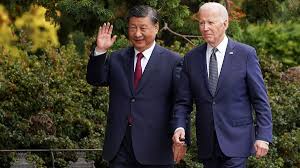US President Joe Biden engaged in a phone conversation with Chinese President Xi Jinping on Tuesday morning, addressing various aspects of bilateral relations, alongside regional and global concerns such as counternarcotics progress, cooperation in artificial intelligence, and climate change initiatives. This marks their first direct communication since their summit in California last November.
A senior US administration official, briefing reporters ahead of the call, outlined the agenda, emphasizing discussions on strengthening communication channels, managing competition, and addressing regional and global challenges. “Our approach to the People’s Republic of China remains consistent, centered around investment, alignment, and competition,” the official noted.
The call symbolizes a return to routine dialogue between the two influential nations, initiating a series of high-level engagements in the coming weeks. Treasury Secretary Janet Yellen is scheduled to visit China on Thursday, followed by Secretary of State Antony Blinken.
Highlighting the significance of diplomacy in managing tensions and averting unintended conflicts, the call underscores the ongoing efforts to maintain dialogue and promote stability. Previous interactions, including National Security Advisor Jake Sullivan’s meeting with the Chinese director of the Office of Foreign Affairs Commission and Foreign Minister Wang Yi in Bangkok in January, and Secretary of State Antony Blinken’s discussions with Wang in Munich in February, underscore this commitment to intensive diplomacy.
Key Points from Biden-Xi Phone Call:
Taiwan, South China Sea, Election Interference
Ahead of the upcoming inauguration of Lai Ching-te, Taiwan’s president-elect, the two leaders engaged in discussions regarding Taiwan. Lai Ching-te has pledged to uphold the island’s de-facto independence from China and strengthen ties with other democratic nations. President Biden reiterated the United States’ adherence to the longstanding “One China” policy and emphasized opposition to any coercive measures aimed at bringing Taiwan under Beijing’s control.
President Biden, aged 81, expressed apprehensions about China’s activities in the South China Sea, particularly its recent attempts to obstruct the Philippines’ resupply efforts at the disputed Second Thomas Shoal, a country with which the US has treaty obligations. He urged China to fulfill its commitments to combat illegal narcotics and regulate precursor chemicals export.
During the call, President Biden reiterated warnings against Chinese interference in the 2024 US elections and ongoing malicious cyberattacks targeting critical American infrastructure. Human rights issues were also raised, including concerns about Hong Kong’s restrictive national security law and treatment of minority groups.
Furthermore, President Biden addressed China’s defense cooperation with Russia, especially in light of Russia’s efforts to bolster its weaponry amid the conflict in Ukraine. He urged China to leverage its influence on North Korea to de-escalate tensions amid growing nuclear concerns.
Additionally, President Biden highlighted concerns regarding China’s “unfair economic practices” and pledged to take necessary measures to safeguard US security interests.
Biden Seeks Sustained US-China Relations Amidst Persistent Tensions
Following their November summit in California, which saw renewed ties between the two nations’ militaries and commitments to combat deadly fentanyl trafficking from China, President Biden emphasizes the importance of ongoing dialogue to prevent direct conflict between the world’s two largest economies.
Reports from both US and Chinese officials indicate that the November meeting was productive, although significant differences persist. While some analysts view this as a sign of improving relations, others caution against overly optimistic interpretations, noting that core disagreements remain unresolved.
Tensions between the US and China have persisted, exacerbated by visits like former House Speaker Nancy Pelosi’s trip to Taiwan in 2022 and concerns over Chinese ownership of social media giant TikTok. Recent legislative efforts seek to address these concerns by potentially banning TikTok unless its Chinese owner, ByteDance, divests within six months.
In addition, Treasury Secretary Janet Yellen’s upcoming visit to Guangzhou and Beijing underscores ongoing economic challenges. Yellen has expressed concerns about Beijing’s dominance in green energy markets, warning that increased production could distort global prices and impact global economic growth.


















